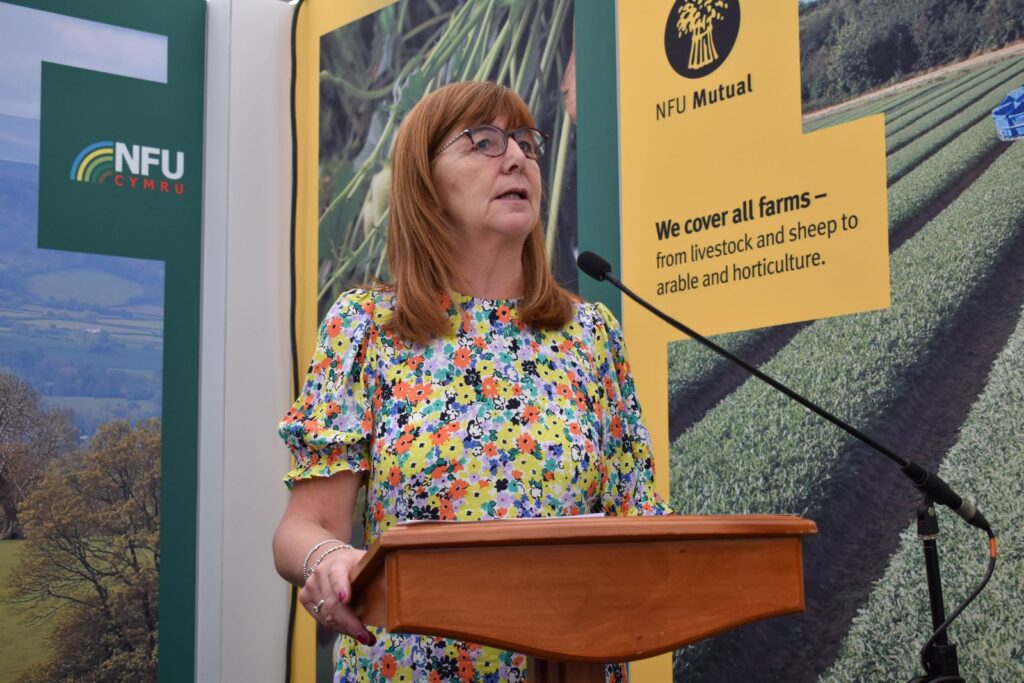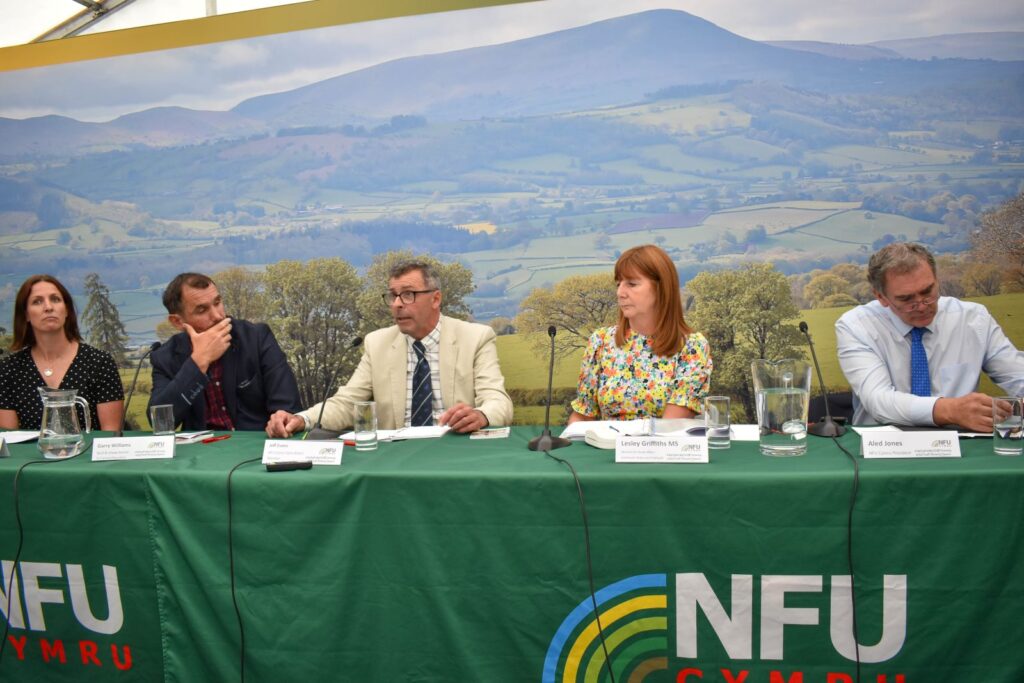Farmers call for flexibility within SFS to avoid “irreversible damage”
31st July 2023
At a seminar on the Welsh government’s proposed Sustainable Farming Scheme (SFS) hosted by NFU Cymru, farmers have raised concerns over the 10% tree cover and habitat targets with rural affairs minister Lesley Griffiths and called for greater flexibility to make the scheme viable for producers.

Rural affairs minister Lesley Griffiths addressing farmers and NFU Cymru members at the Royal Welsh Show.
On day two of the Royal Welsh Show (Tuesday 27th July), NFU Cymru president Aled Jones welcomed farmers and stakeholders to the Union’s marquee, acknowledging the widespread concern in the industry regarding the proposed SFS and the future of farming in Wales.
The rural affairs minister unveiled the proposals of the scheme on 6th July last year, ahead of the 2022 Royal Welsh Show. While farming systems differ in different parts of the country, Mr Jones said there will be opportunities for all farmers to contribute to the scheme and reap the benefits.
“I’ve always said that we need 100% of our farmers into the scheme, because if we want to impact change, we need that mass participation.”
Mr Jones went on to point out that the challenges facing agriculture today are multi-faceted, with huge considerations on climate change, and there is much farmers can do to help the environment. At the same time, he assured the fundamentals of the scheme are still based around producing sustainable food for future generations and maintaining food security.
Before handing over to the minister, Mr Jones invited farmers to get involved with the codesign of the scheme and make sure it works for their farm by responding to the final consultation on SFS due to be launched later this year.
To start with, rural affairs minister Lesley Griffiths reiterated the Welsh government’s commitment to a fairer, stronger, and greener future Wales and to continue to help producers build a resilient farming sector.
She acknowledged UK farmers are facing many challenges, with increased input costs, animal health and disease issues, and the loss of EU funding as a result of Brexit posing an existential threat to many businesses.
In reference to the SFS, the minister said: “The scheme has been designed to tackle climate and nature emergencies at the same time as being able to sustainably produce safe, quality food.”
Addressing the 10% tree cover target that is of concern to many farmers, MS Griffiths confirmed existing tree cover will be counted towards this requirement, which includes broad leaf, conifers, orchards and individual trees in hedges and fields.
She explained the target contributes towards the Welsh government’s goal of planting 43,000 hectares of new woodland by 2030, which has been set on the back of the UK Climate Change Committee’s recommendations.
While farming and food production are at the core of SFS, the minister said the industry cannot lose sight of the need to address the climate and nature emergencies.
“Climate change is absolutely the biggest threat to food production over the medium to long term, so we’ve got to act now and mitigate the impacts.”
In her concluding remarks, Ms Griffiths highlighted the government’s desire for every farmer to be part of the scheme and urged producers to make their voices heard in the final consultation at the end of the year. The feedback received will be used to advise the development of the final scheme proposals and make it more accessible for active farmers.
Making the case for tenant farmers
Following the minister’s speech, Jeff Evans, tenant dairy farmers and NFU Cymru dairy board member, highlighted some of the barriers to uptake in the SFS among tenant farmers.
Mr Evans runs a spring calving dairy herd that is low-cost and grass-based alongside a beef enterprise and some rotational cropping to improve biodiversity on the farm. The business sells its milk to First Milk, a farmer-owned cooperative, and as part of that commitment has been doing some regenerative farming to reduce emissions and help the net zero target.
Regarding the SFS, he commented: “One thing that concerns me the most is the 10% tree cover and 10% habitat, and as a tenant farmer, we want to be in the universal action of this scheme.
“This will put pressure on an already decreasing land base due to many factors, and productivity will be decreased which is already under pressure.”
“If productivity is curtailed due to the SFS, the knock-on effect in the supply chain could be catastrophic,” he added.
Mr Evans went on to highlight that planting trees and creating habitats on productive land can only devalue the land, and so landlords will be reluctant for tenants to sign up to any long-term environmental schemes. Therefore, until the decision to opt in is put into the hands of the tenants who farm the land, uptake in this sector will remain low.
“For those reasons, as a tenant, we can’t sign up to be part of this new SFS, and the Welsh govt plans for net zero will certainly be jeopardised and there will be no winners in this situation,” he warned.
“What we need are lots of small wins, which are easily achievable and will increase productivity, sustainability, and by using technology and innovation, we can improve efficiencies,” Mr Evans concluded.
“Don’t let us get to the stage where the damage will be irreversible”
In an emotional address, upland beef and sheep farmer Garry Williams called for flexibility within the SFS where trees and habitat cover are concerned and said common rights holders must be protected in the scheme.
Farming in the Black Mountain area of Brecon Beacons National Park, Mr Williams is one of over 3,000 common rights holders in Wales, with 50% of current BPS payments made up of common allocatable hectares.
“If that is not brough into the universal scheme, we will lose £15,000 of the £30,000 currently received by our farm business; quite simply, we will go out of business,” he stressed.
Mr Williams has been involved in every environmental scheme since the beginning and has planted tens of thousands of hedgerows with trees over the years. He urged the minister to allow for flexibility within the 10% tree target and to include hedgerows and other cropping that can efficiently sequester carbon.
He also pointed out the growing issue of companies planting large areas of the local landscape with trees for carbon offsetting, which has the potential to become a large-scale fire hazard with the weather becoming increasingly hot and dry.
“I’ve had a fire within 250m of my farm, and to be quite frank, that’s close enough,” he said, adding that common land must be managed as much from the perspective of biodiversity as that of fire risk.
Mr Williams also said farmers are aware of the pressures on government officials, however agriculture and the environment represent less than 3% of the Welsh Assembly budget to manage 80% of the area and secure food production, which he pointed out seems like good value.
Finally, he expressed concerns over the region that is home to a Welsh-speaking community becoming a retirement haven for the wealthy, making a personal reference to his eldest son who cannot afford to live where he was brought up due to being priced out of the community.
“The one I’m worried about the most is my youngest son who wants to be a farmer – has he got a future? And the policy you [the rural affairs minister] put in place will decide that.”
Addressing the points made by speakers and the audience, Ms Griffiths said the government wants to make sure the SFS will work for active farmers and is keen to work together with producers to identify barriers to entry and make the necessary adjustments.
She acknowledged the importance of flexibility in the scheme and supporting those farming on common land to be able to enter the scheme. Regarding hedgerows, she said they also hold value within SFS and are counted towards the 10% habitat cover, while individual trees in hedges form part of the overall tree cover requirement.
Finally, the minister confirmed she will continue to work with NFU Cymru to support Welsh farmers in the future.

Speakers at the NFU Cymru seminar included (from right to left): NFU Cymru president Aled Jones; rural affairs minister Lesley Griffiths; tenant dairy and beef farmer Jeff Evans; upland farmer Garry Williams; and upland farmer Bryony Gittins.
